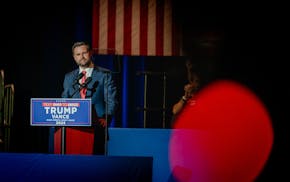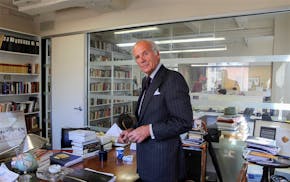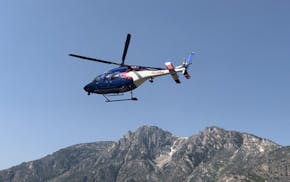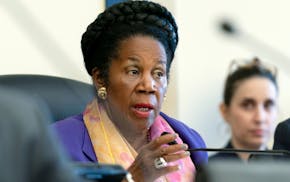HOUSTON — George H.W. Bush was largely known for his work in public office, from his time as a Texas congressman and CIA director to his years in the White House as president and Ronald Reagan's vice president. But the World War II hero and great-grandfather also was an avid skydiver, played in the first-ever College World Series and was the longest-married president in U.S. history.
Here's a closer look at those and other elements of his life:
NICKNAMES: George H.W. Bush was known to his family as "Poppy." His wife said her husband was named after his maternal grandfather, who was known as "Pops," so the younger Bush was called "Little Pops." The nickname evolved into Poppy, which Bush "hated as he got older, but it was hard to break such a long-standing habit," Barbara Bush wrote in her memoir. But his grandchildren knew him as "Gampy," a name he embraced.
MEETING HIS WIFE: Bush met his wife at a dance in Greenwich, Connecticut, in 1941. He was a 17-year-old high school senior, while she was 16 and attending school in Charleston, South Carolina, and home for Christmas. The band was playing Glenn Miller tunes, but when he asked her to dance, the music changed to a waltz. He didn't how to waltz, so they talked. They were married on Jan. 6, 1945, and were the longest-married presidential couple. She died on April 17, 2018
THE SEA: Bush's lifelong love of the sea and boats began in Maine, with his grandfather teaching him how to handle and dock a boat. At age 9, he and his 11-year-old brother were first allowed to take out their grandfather's lobster boat by themselves. Bush wrote in a 1987 book that he loved "the physical sensation of steering a powerful machine, throttle open." In 2010, to enjoy at his home in Maine, he bought a 38-foot fishing boat, Fidelity V, equipped with three 300-horsepower engines and capable of reaching 75 mph.
THE AIR: During World War II, Bush was one of the Navy's youngest pilots when he was shot down during a 1944 bombing mission. He parachuted into the Pacific Ocean and was rescued by an American submarine. He fulfilled a wartime promise to himself to someday skydive just for fun in 1997, when at age 73 and over his family's objections, he bailed out over a military base in Arizona, "to show that old guys can still do stuff," he said. He later marked his 75th, 80th, 85th and 90th birthdays with parachute jumps.
BASEBALL: As a first baseman and captain of his baseball team at Yale University, Bush played in the first-ever College World Series in 1947. His team lost to the University of California. Yale again reached the College World Series finals in 1948 and this time lost to Southern California. Sparky Anderson, who would win the World Series as manager of the Cincinnati Reds and Detroit Tigers, was a batboy on the Southern Cal team.
OIL: Bush learned the oil industry in West Texas, starting in 1948 as an equipment clerk for an oilfield services company. He drove from New England to Texas in a 1947 Studebaker and ordered his first chicken fried steak — a Texas staple — at a restaurant in Abilene, wondering if it was chicken or steak but trying to fit in. The deep-fried steak smothered in gravy became a Bush favorite. A restored 1947 Studebaker identical to the one he owned is on display at his presidential museum at Texas A&M University.
GULF WAR: The signature event of Bush's presidency was the 1991 Gulf War. But when he ordered U.S. troops to Kuwait, he acknowledged, he was prepared for the worst. "We feared it would go badly," he told The Associated Press in 2011, on the 20th anniversary of Operation Desert Storm. "But it went far more clean ... far more quickly, far less loss of our lives and Iraqi lives, than we worried about. It was very rewarding."
LETTER TO THE EDITOR: Bush said he wrote one letter-to-the-editor as president, and it went to The New York Times regarding a story about him being out of touch because he didn't know about grocery store price-scanning devices. "I was — I thought — smeared by an ugly story," he said in a 1999 C-SPAN interview. Bush said his remark describing the device as "amazing" came at a convention showing off the new technology and was portrayed by "some lazy little reporter ... (who) wasn't even there. ... And the damn story lived on."
HORSESHOES: During his White House years, Bush annually held two horseshoe tournaments with teams made up of everyone who worked there, including groundskeepers, pilots, cooks and gardeners. "One of the best things we did," he recalled during a 2000 interview with Time magazine. He headed the ranking committee, making himself and son Marvin the top seeds. The horseshoe pits were by the southwest gate on the White House grounds, and the sounds of clanging horseshoes could be heard daily as workers practiced ahead of the tournaments.
FINAL RESTING PLACE: After suffering an irregular heartbeat in 2000, he told reporters as he was released from a Florida hospital that mortality was something he thought about "but not with fear. If you've got faith, you don't think of it with fear." His burial site, behind his presidential museum in College Station, Texas, is near a pond and across a footbridge over a creek where three large post oaks form a semicircle. "The loveliest resting spot I have ever seen," Barbara Bush once described it. Their daughter, Robin, who died of leukemia at age 3 in 1953, was moved to the site in 2000, and Barbara Bush was buried there in April 2018.

JD Vance, an unlikely friendship and why it ended

Lewis Lapham, editor who revived Harper's magazine, dies at 89

Body of missing Minnesota hiker recovered in Beartooth Mountains of Montana
Mike Lindell and the other voting machine conspiracy theorists are still at it

